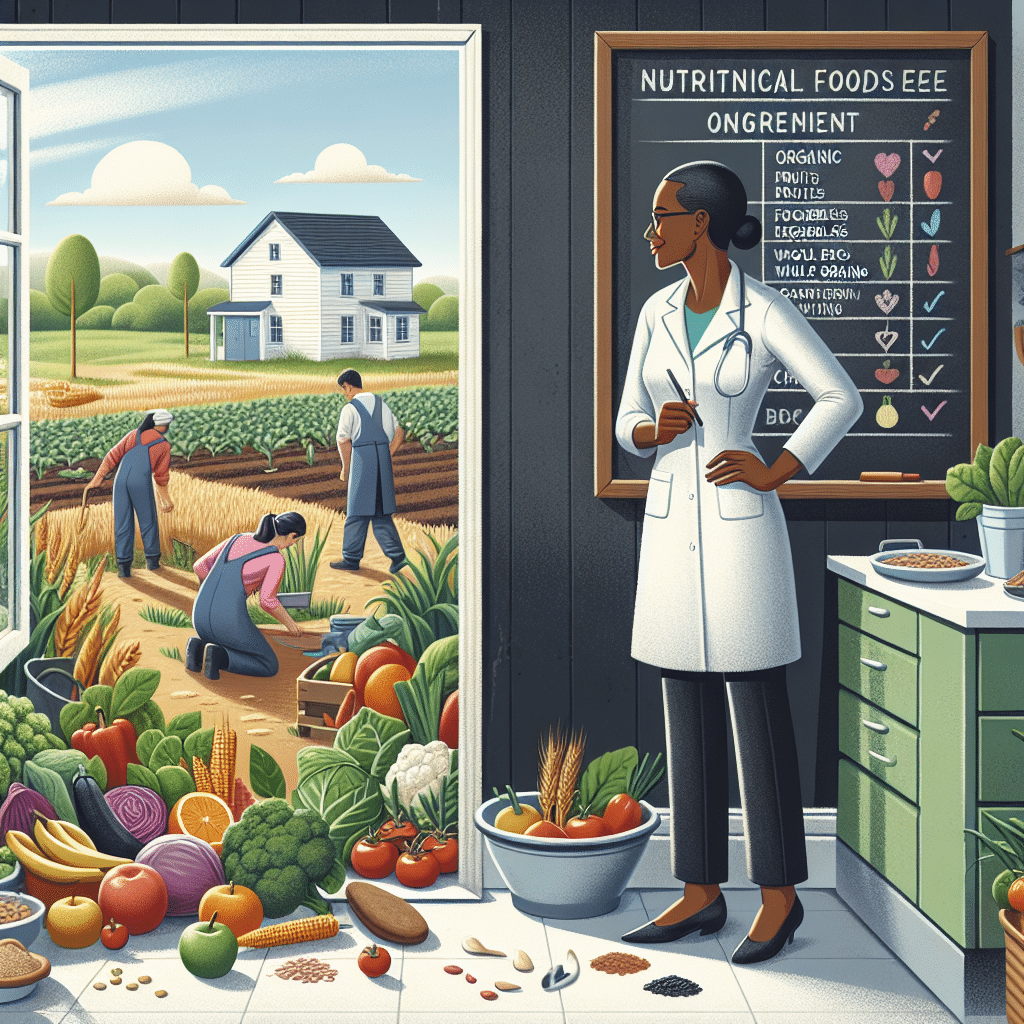Clean, Natural, and Organic: A Dietitian Perspective
-
Table of Contents
- Clean, Natural, and Organic: Unveiling a Dietitian’s Perspective
- Understanding Clean, Natural, and Organic
- The Dietitian’s Take on Clean Eating
- Natural Foods: A Closer Look
- Organic Foods: Worth the Hype?
- Benefits of a Clean, Natural, and Organic Diet
- Challenges and Considerations
- Case Studies and Statistics
- Conclusion: Integrating Clean, Natural, and Organic Foods
- Enhance Your Diet with ETprotein’s Organic Protein Products
Clean, Natural, and Organic: Unveiling a Dietitian’s Perspective

In recent years, the health and wellness industry has seen a significant shift towards clean, natural, and organic eating. This movement is not just a fad but a response to the growing concerns about the impact of processed foods and chemicals on our health and the environment. As a dietitian, understanding the nuances of this trend is crucial for providing informed guidance to those seeking to improve their diets and overall well-being. In this article, we will explore what these terms mean, their benefits, and how they fit into a balanced diet from a dietitian’s perspective.
Understanding Clean, Natural, and Organic
Before delving into the dietitian’s viewpoint, it’s essential to define what clean, natural, and organic eating entails:
- Clean Eating: This concept focuses on consuming whole, unprocessed foods that are free from additives, preservatives, and artificial ingredients.
- Natural: Foods labeled as natural are generally understood to be minimally processed and free of synthetic colors, flavors, and preservatives. However, the term is not strictly regulated.
- Organic: Organic foods are produced without the use of synthetic pesticides, genetic modification, or irradiation. They adhere to specific standards set by organic certification bodies.
The Dietitian’s Take on Clean Eating
Dietitians advocate for clean eating because it emphasizes whole foods, such as fruits, vegetables, lean proteins, whole grains, and healthy fats. This approach aligns with dietary guidelines that recommend a nutrient-dense diet to support overall health. Clean eating also encourages mindful food choices, which can lead to better eating habits and improved health outcomes.
Natural Foods: A Closer Look
While the term “natural” can be ambiguous, dietitians focus on the quality and processing level of foods rather than the label itself. They recommend foods that are as close to their original state as possible. For example, an apple is preferable to apple-flavored snacks. However, it’s important to note that “natural” does not always equate to healthier, and dietitians are keen to educate their clients on making informed choices.
Organic Foods: Worth the Hype?
Organic foods have gained popularity for their perceived health and environmental benefits. Dietitians recognize that organic produce can have lower pesticide residues and may be more environmentally sustainable. However, they also emphasize that organic does not necessarily mean more nutritious. The key is to prioritize a diet rich in fruits and vegetables, whether organic or conventionally grown.
Benefits of a Clean, Natural, and Organic Diet
Adopting a diet that focuses on clean, natural, and organic foods can offer several benefits:
- Improved Nutrient Intake: Whole foods are nutrient-dense, providing essential vitamins, minerals, and antioxidants.
- Reduced Exposure to Additives: Minimizing processed foods can decrease the intake of artificial ingredients and preservatives.
- Environmental Sustainability: Organic farming practices can be better for the environment, promoting biodiversity and soil health.
- Support for Local Economies: Purchasing organic and locally-sourced foods can support small farmers and businesses.
Challenges and Considerations
While there are clear advantages to clean, natural, and organic eating, dietitians also recognize the challenges that come with it:
- Cost: Organic foods can be more expensive, which may not be feasible for everyone’s budget.
- Accessibility: Not everyone has access to a wide variety of organic or natural foods, particularly in food deserts.
- Balanced Diet: It’s crucial to maintain a balanced diet. Focusing too heavily on food labels can lead to nutritional gaps or an overly restrictive diet.
Case Studies and Statistics
Research supports the benefits of a diet rich in whole foods. A study published in the Journal of Nutrition found that a diet high in fruits and vegetables is associated with a reduced risk of chronic diseases. Additionally, the Environmental Working Group reports that organic foods can significantly reduce pesticide exposure.
Conclusion: Integrating Clean, Natural, and Organic Foods
In conclusion, a dietitian’s perspective on clean, natural, and organic eating is nuanced. It’s about making informed choices that prioritize health, nutrition, and sustainability. By focusing on whole foods and being mindful of food quality and production methods, individuals can enjoy the benefits of a nutrient-different diet that supports both personal health and the environment.
Enhance Your Diet with ETprotein’s Organic Protein Products
If you’re looking to incorporate high-quality protein into your clean, natural, and organic diet, ETprotein offers a range of organic bulk vegan proteins that align with these values. Their products, including organic rice protein, pea protein, and various seed proteins, are non-GMO, allergen-free, and boast a neutral taste, making them an excellent addition to any health-conscious diet.
About ETprotein:
ETprotein, a reputable protein and L-(+)-Ergothioneine (EGT) Chinese factory manufacturer and supplier, is renowned for producing, stocking, exporting, and delivering the highest quality organic bulk vegan proteins and L-(+)-Ergothioneine. They include Organic rice protein, clear rice protein, pea protein, clear pea protein, watermelon seed protein, pumpkin seed protein, sunflower seed protein, mung bean protein, peanut protein, and L-(+)-Ergothioneine EGT Pharmaceutical grade, L-(+)-Ergothioneine EGT food grade, L-(+)-Ergothioneine EGT cosmetic grade, L-(+)-Ergothioneine EGT reference grade and L-(+)-Ergothioneine EGT standard. Their offerings, characterized by a neutral taste, non-GMO, allergen-free attributes, with L-(+)-Ergothioneine purity over 98%, 99%, cater to a diverse range of industries. They serve nutraceutical, pharmaceutical, cosmeceutical, veterinary, as well as food and beverage finished product distributors, traders, and manufacturers across Europe, USA, Canada, Australia, Thailand, Japan, Korea, Brazil, and Chile, among others.
ETprotein specialization includes exporting and delivering tailor-made protein powder and finished nutritional supplements. Their extensive product range covers sectors like Food and Beverage, Sports Nutrition, Weight Management, Dietary Supplements, Health and Wellness Products, and Infant Formula, ensuring comprehensive solutions to meet all your protein needs.
As a trusted company by leading global food and beverage brands and Fortune 500 companies, ETprotein reinforces China’s reputation in the global arena. For more information or to sample their products, please contact them and email sales(at)ETprotein.com today.














